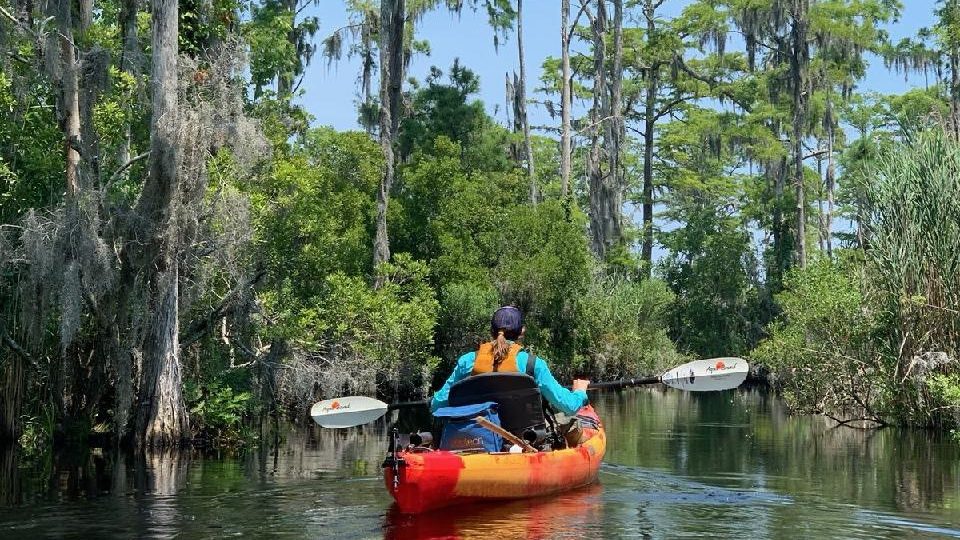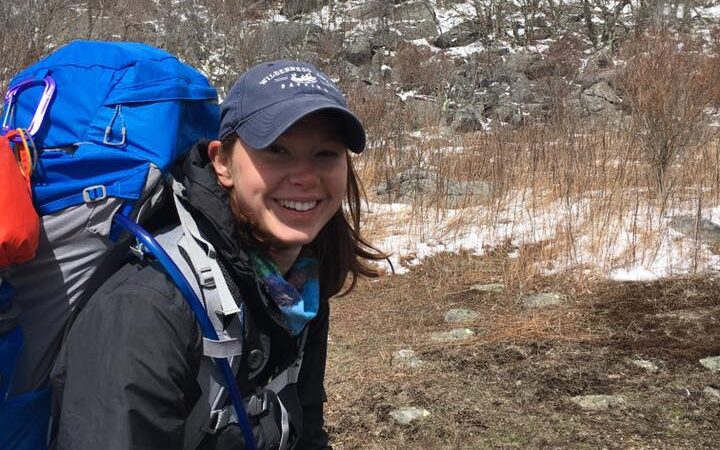Researcher Spotlight – Justine Neville

2020-21 Global Change Fellow
PhD Student, Department of Forestry and Environmental Resources
Advisor: Dr. Ryan Emanuel
Every year the Southeast Climate Adaptation Science Center funds a multi-disciplinary cohort of Global Change Fellows representing colleges across NC State University. Here are some highlights about 2020-21 Fellow, Justine Neville, and the applied research she’s conducting.
About You
What do you study?
I’m a hydrologist studying episodic saltwater intrusion in coastal North Carolina. My research seeks to better characterize individual saltwater intrusion events through the development of empirical metrics that can be applied in any coastal environment. In addition, my work utilizes satellite imagery to determine how landscape alteration influences vulnerability to saltwater intrusion. The ultimate goal of this work is that it will be used by land managers and policy makers to develop meaningful policy and create a better understanding of the extent and severity of saltwater intrusion in coastal environments.
What is your dream job?
My dream job would be working as a federal scientist or as a professor at a research university. To me, one of the most important aspects of science is the broader implications of research so I would love to be conducting work that is at the interface of science, policy, and communication. By combining these three disciplines effectively, I feel science has the greatest capability to be meaningful and positively impact others in society. As the global climate continues to change, water resources will change drastically, so working in a research area that will focus on the management and sustainability of our water resources for society and nature really interests me.
About Your Research

How can your research be used to inform management decisions?
My research will inform management decisions through the ease with which my metrics can be adapted by others. Code developed to calculate the severity, duration, frequency, and time between events will be made publicly available so that managers working in coastal systems can compute said metrics on their own salinity. This will tell them which management sites are more susceptible to saltwater intrusion, hopefully leading to more targeted adaptive management decisions. If coastal datasets are long enough, my metrics can even be used to determine how saltwater intrusion has changed over the last few decades.
How would you describe your research to a 3rd grader?
In areas near the coast, freshwater and saltwater meet naturally, but sometimes saltwater moves farther inland where it normally is very fresh because of things like drought, strong winds, and hurricanes. When this happens, not all plants and fishes can live in such salty environments. In my research, I’m trying to understand what parts of the coast can experience this more often, and which ones are likely to experience it in the future. Using the data I collect, I can determine how often, how salty, and how long a specific area is exposed to high levels of salinity, and connect that to how stressed the plants and fish of that ecosystem are.
About Your Global Change Fellow Experience
How do you expect the SE CASC Global Change Fellows Program to impact you and your work?
As I continue through the Global Change Fellows Program, I feel it will enhance my ability to communicate my science with those not in my area of expertise, while emphasizing the value of effective communication in my own work when it comes to the execution of the broader impacts of my study. The Global Change Fellows Program has offered numerous opportunities for professional development and exposed me to a diverse group of scientists, which has encouraged me to begin to think about the more far reaching impacts of my work beyond the health and ecology of coastal ecosystems, to the people who work, live, and play in these systems as well.
What has been the most rewarding part or your favorite part of being a SE CASC Global Change Fellow?
As a Global Change Fellow, the entire experience has been incredibly rewarding. In our bi-weekly seminars, the SE CASC has exposed me to a myriad of different science communication and management topics which I really value, as my own research doesn’t necessarily cover all the topics we’re introduced to in these seminars. Additionally, working with other fellows in the planning and coordination of the Global Change Seminar Series for the public has been a valuable experience in working collaboratively with others, and learning about what goes on behind the scenes to make all these wonderful seminars and webinars available to the public.
